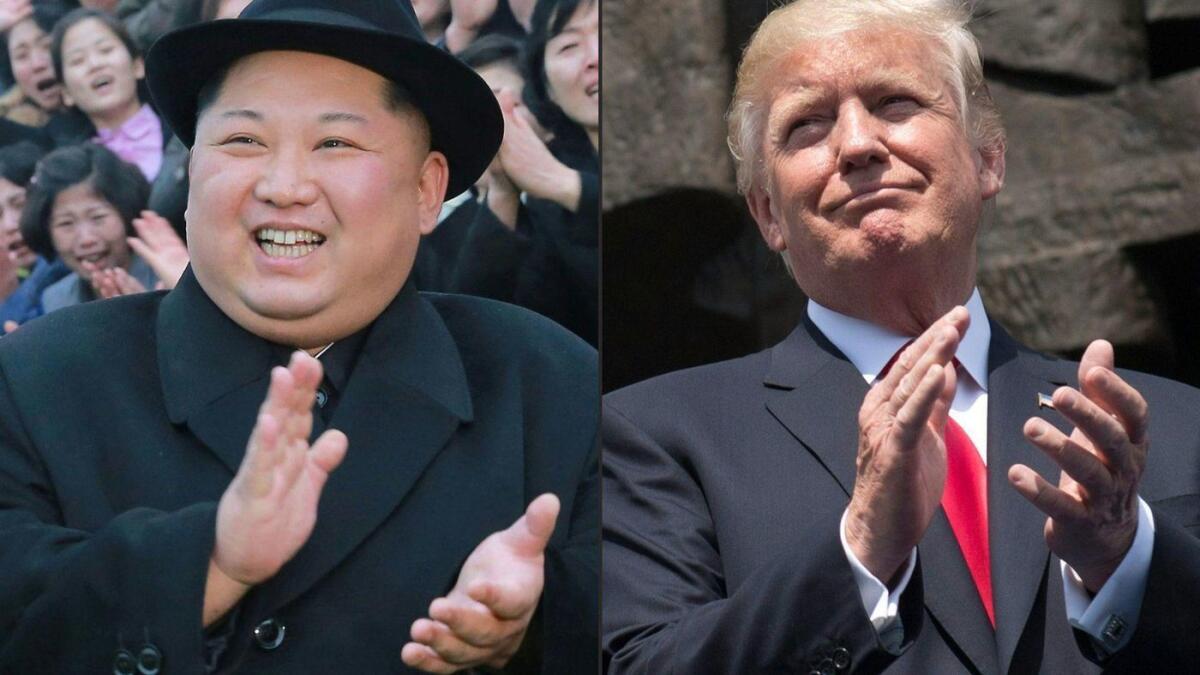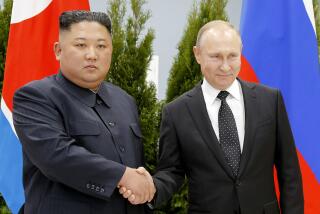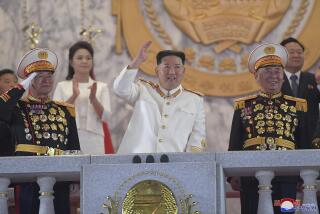Would a North Korea nuclear deal be better than the one Trump just abandoned with Iran?

When President Trump turned against the global tide and withdrew from the landmark, multi-nation Iran nuclear deal, he cited its failure to curtail the Islamic Republic’s other “malign behavior.”
That included Iran’s development of ballistic missiles and its support of militant groups beyond its borders.
Now, as he is about to embark on the potentially historic negotiation of an agreement with nuclear-armed North Korea, those criticisms of the Iran agreement could potentially put the president in a bind. He faces a challenge similar to the one President Obama faced in his dealings with Iran.
In the view of much of the international community, North Korea is every bit as guilty of “malign behavior” as Iran, including robust missile production, assassinations of rivals on foreign soil, brutal human rights abuses and efforts to export its weapons technology to other trouble spots.
And yet, the Trump administration has shown little appetite to tackle those other issues. The great irony, experts and diplomats say, is that any North Korea deal will probably be as limited as the Iran deal was: a narrow, laser focus on the nuclear program.
Perhaps even more limited, experts say.
At minimum, that comparison will create an inconsistency that Trump will have to explain. He repeatedly attacked the Iran deal — which was comprehensive and by most accounts successful in doing what it was designed to — as “horrible” and one of the worst ever. So a deal with North Korea has to be better, more far-reaching — and yet it probably can’t be, experts say.
“I really think it would be a mistake to overload the agenda,” Joseph Yun, who until recently served as the U.S. special envoy for Korean policy, testified to a Senate committee this week.
As pressing as issues such as human rights and chemical weapons might be, Yun said, taking them on alongside the enormous complexity of dismantling Kim Jong Un’s vast nuclear arsenal would be a recipe for disaster.
The talks must “concentrate on denuclearization above all else,” he said.
Yun’s comments won quick approval from several Republican senators, whose support in the North Korean negotiations would be valuable to the administration — and who, like Trump, opposed the Iran agreement.
“Look, we’re all about human rights,” Sen. James Risch (R-Idaho) responded to Yun. “But if you try to overload this and try to resolve all these things at once, I think you’re just setting things up for failure.”
One reason Trump felt unencumbered in tossing out the Iran deal, against the advice of most of his national security team, was that it was not a formal treaty ratified by Congress.
Secretary of State Mike Pompeo has made clear that any future pacts with Iran will have to be sanctioned by a treaty.
Thursday, briefing reporters at the White House, he indicated that the same would hold true for a North Korea agreement.
“We’re hoping to submit a document that Congress would also have a say in,” he said.
That move could give a North Korea pact the sort of political support that the Iran deal lacked. But it could also open any agreement to partisan political battling of the kind that the Obama administration hoped to avoid by not handling the Iran deal through a treaty that would require ratification by the Senate.
Nuclear negotiations with North Korea are even more complex than those with Iran. To begin with, North Korea’s nuclear program dwarfs the program that Tehran had and agreed to mothball. Iran does not have any nuclear weapons; North Korea has somewhere between 20 and 60, according to U.S. estimates.
Any agreement to eliminate that stockpile would require detailed negotiation that no one — including, as of recently, Trump himself — expects to see resolved in Tuesday’s summit in Singapore.
“We are literally talking a multiyear process,” said James Carafano, a security and foreign policy expert at the conservative Heritage Foundation, which has advised Trump. “It’s kind of like an arranged marriage. I have very low expectations, and if it works out, great.”
Even if Trump and Kim agree on a basic definition of “denuclearization,” the steps to begin to eliminate Pyongyang’s stockpile are formidable and time-consuming and would require a cast of thousands of experts and inspectors.
Teams would have to be assembled to shut down facilities, dismantle warheads and unravel procurement systems. U.S. intelligence agencies believe North Korea has built a widely dispersed network of 100 or more clandestine production facilities to create fissile material and testing components, and to assemble and store the actual warheads.
Unlike Iran, North Korea has long been a closed, isolated nation. Inspectors from the United Nations’ International Atomic Energy Agency, the group that is monitoring Iran and would be tasked to do the same in North Korea, last set foot in the country nearly a decade ago.
The very first step toward denuclearizing would require Kim to declare what weaponry and materiel he has amassed, and on that he could easily cheat. Critics of the Iran deal argue that Tehran also cheated in its initial declaration because it failed to list archives that compiled much of the technical know-how that Iranian scientists had accumulated.
Some experts say North Korea’s status as a nuclear-armed nation is so vastly different from conditions in Iran that comparing the two is a matter of apples and oranges.
“It’s very hard to make comparisons,” said Robert Gallucci, who led 1994 talks with North Korea for the Clinton administration. “Iran doesn’t even have fissile material” used to produce nuclear weapons, he noted.
Suzanne DiMaggio, a senior fellow at the New America think tank in Washington who has been involved in past negotiations, said the administration should use aspects of the Iran deal as a model on issues like multilateral diplomacy, conflict resolution and its intrusive inspection regimen.
“The administration would be lucky to get a deal as good as the JCPOA,” she said, using the acronym for the Iran deal — the Joint Comprehensive Plan of Action.
Where North Korea will be looking to the Iran deal is in the prospect of sanctions relief. The Iran deal lifted key international sanctions, allowing the country to rejoin global markets and finance systems and to export oil.
Kim appears to want two achievements from the summit meeting: international recognition and a lifting of his country’s isolation, which he has already won; and removal of the international punitive measures that have helped cripple his economy. He is eager to modernize and normalize what has been a backward, impoverished country.
“When [Kim] looks down the road and he sees 10 U.N. Security Council resolutions, maximum pressure 2.0, … he’s seeing that he will not be able to rule for 50 years under those conditions,” said Victor Cha, who worked on Asia issues under the George W. Bush administration. “That may be why he’s coming to the table.”
Regional geopolitics will also figure into how successful the negotiations can be. In the Middle East, Iran has several neighbors that sustain hostilities with the Islamic Republic, another dynamic that eased the way for Trump to abandon the deal.
In Asia, however, a policy favoring war with North Korea “is not viable,” said Catherine Killough, a senior fellow at the Ploughshares Fund, an organization that promotes nuclear nonproliferation. Japan and South Korea, as well as China, know that a war would be calamitous for the region.
“I see it as a very convenient moment for [Trump] to have a win in Asia and have a war in the Middle East,” she said. “It plays very well to his base.”
When Trump left the Iran deal, world leaders, diplomats and foreign policy experts predicted the action would erode American credibility and discourage countries from trusting Washington’s promises.
That, however, is probably not an issue in the early encounters with Kim: There is no trust, and it would be a long time in coming, former negotiators say.
Instead, unlike talks with Iran, where most of the international players already were familiar with one another, the Trump-Kim summit will be more about atmospherics, broad principles and what the president has called “getting to know you.”
“I don’t see Kim Jong Un bringing out schemata of his nuclear facilities and talking about how to dismantle them,” said Michael J. Green, senior vice president for Asia at the Center for Strategic and International Studies. “And I don’t see Donald Trump doing that.”
The process will quickly revert to Pompeo and others to “put meat on the bones,” Green predicted.
Pompeo, at the White House, said that Trump would not accept a “bad deal” with Pyongyang.
“The fact that our two leaders are coming to the table shows that the two sides are very serious,” he said. “The diplomatic model we’ve used to date is different from past efforts. ... This is different.”
For more on international affairs, follow @TracyKWilkinson on Twitter
Times staff writers Noah Bierman and David S. Cloud contributed to this report.
More to Read
Start your day right
Sign up for Essential California for news, features and recommendations from the L.A. Times and beyond in your inbox six days a week.
You may occasionally receive promotional content from the Los Angeles Times.






